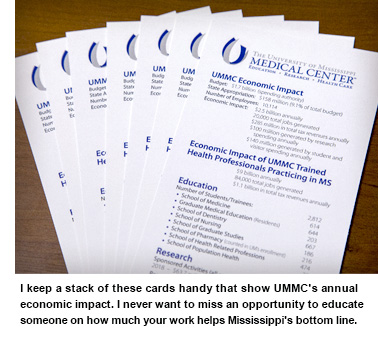Our Large and Meaningful Impact on Mississippi
Good morning!
The first week of September signals many things: One of the less appealing is the approach of flu season, which normally begins in October and ends in March. Student and Employee Health began offering vaccinations to all UMMC personnel at no cost this week. By now, everyone should know that flu vaccinations are mandatory for all employees, students, volunteers and others who are regularly on our campus. A HealthStream module is also required viewing and provides lots of details. Thanks for your participation in this year’s drive to get everyone vaccinated by Dec. 9 to protect not only our patients but ourselves.
 Last Friday I had the pleasure of attending part of the Department of Emergency Medicine’s annual planning retreat. That department is still my academic home as a faculty physician and I like to stay in touch – just in case this vice chancellor thing doesn’t work out!
Last Friday I had the pleasure of attending part of the Department of Emergency Medicine’s annual planning retreat. That department is still my academic home as a faculty physician and I like to stay in touch – just in case this vice chancellor thing doesn’t work out!
I was asked to give a few remarks, so I provided some updates about the Medical Center. As is typical on such occasions, I touched on a few points about UMMC’s economic impact on the state of Mississippi, which is quite considerable.
One of my ED colleagues, Dr. Jimmy Kolb, asked why we don’t share this information more broadly.
I don’t really have a good answer for that because I feel like we talk about economic impact all the time. Indeed, I have a stack of rack cards in my office – fast facts about UMMC we update every year – that report our economic impact data right at the top. We hand these out liberally, especially during the legislative session.
But knowing Dr. Kolb as I do, and his encyclopedic knowledge of just about everything, I have the feeling that if he hasn’t heard about it, then I haven’t talked about it enough. So that’s how I chose today’s VC Notes topic.
We first commissioned a study of UMMC’s economic impact about a dozen years ago from a national consulting group. That group’s report was the basis of additional analysis about nine years ago by the University of Mississippi’s Social Science Research Laboratory and our own local consultant. As it happens, we are in the process of commissioning a new study that will provide updated data. Because of our growth during the last decade, what I’m sharing today likely understates the impact UMMC has on the state’s economy.
With that introduction, here are the facts:
UMMC has an annual budget that is roughly $1.7 billion. Many people assume that figure represents our state budget, but in fact the taxpayer-supported portion of our budget is less than 10 percent. The majority of our revenue comes from patient care, and a smaller fraction from research. Virtually all of the state dollars we receive go to support our educational programs.
Based on that large economic footprint, along with the multiplier effects that occur in an economy, UMMC’s direct annual economic impact is estimated to be about $2.5 billion. Our spending in the economy does the following:
- supports an additional 10,000 jobs beyond the jobs of our own 10,114 employees;
- produces $285 million in state and federal taxes annually, which means the state is directly reimbursed in tax collections for its investment by our economic activity;
- generates $100 million in impact from our research spending annually; and
- generates $140 million in annual impact from our student and visitor spending.
I will pause here to let that sink in a moment. If the state’s economic activity were depicted as a network map, there would be a giant node centered at 2500 North State Street, Jackson, with connections stretching from Grenada to the Gulf Coast and across the state.
But that’s just the half of it.
When we estimated the economic impact of UMMC-trained health professionals practicing in Mississippi, the results were truly astounding:
- $9 billion in annual economic impact
- 84,000 jobs generated
- $1.1 billion in total tax revenues generated annually
That is an enormous impact, and I am proud of it. Believe me, I’m excited to share it at every opportunity. But what I am most proud of is the work that these data points represent. We are not producing cars or tires. We are not pumping oil or processing chemicals. We are not selling clothes or computers.
All of those things are important. We need those things. They provide jobs and have an impact on our economy, and in many cases make our lives better, safer and more convenient.
The impact of our work can also be measured in the doctors, dentists, nurses, therapists, pharmacists, scientists and other health care professionals trained here. In the new and useful knowledge discovered about the human body and human behavior. In the new treatments and occasionally the cures developed for conditions that otherwise bring us misery and premature death. In the hundreds of thousands of patients for whom the healing power of modern medicine restores good health and well-being each year.
Now that is impact. Your impact. I hope you will join me in sharing this story of the difference we make for the people of our state – and be as proud of it as I am – as we all keep striving for A Healthier Mississippi.



